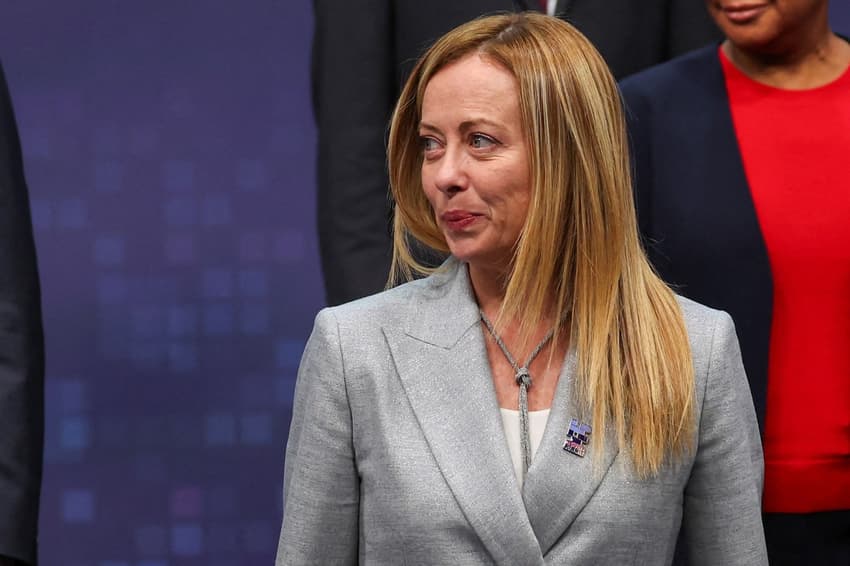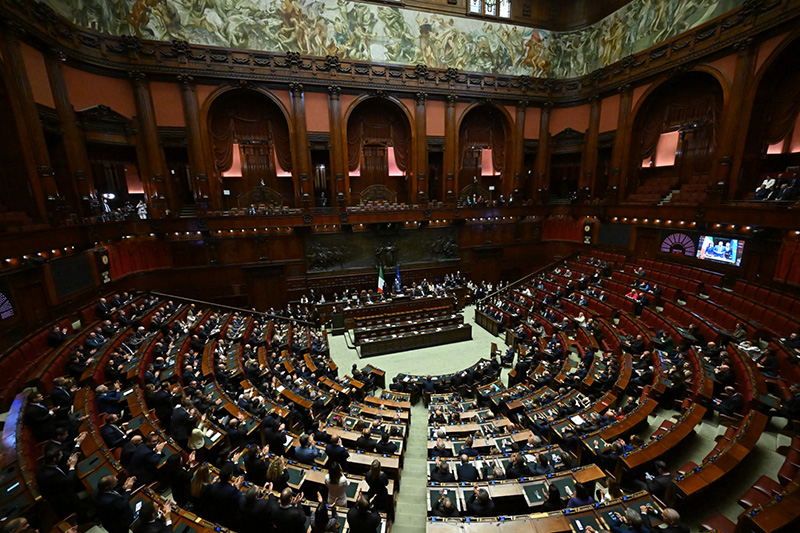Meloni announces major reform to fix Italy’s ‘unstable’ political system

Italy’s government on Friday approved a plan to directly elect prime ministers under what current premier Meloni hailed as “the mother of all reforms"
Meloni's cabinet gave the green light to plans to directly elect prime ministers and ban technocrat or interim governments in a move she said would solve the country’s longstanding problems with political instability.
Her own government, which has been in office for a year, is Italy's seventh in the past decade - a fact she said should justify the change in the constitution.
READ ALSO: The plan to bring in direct elections for Italy’s prime minister
Announcing the plan on Friday, the prime minister said that in the last 75 years Italy has had “68 governments with an average lifespan of a year and a half.”
“In the last 20 years we have had 12 prime ministers,” she added.
The short terms served by Italian governments harm Italy's credibility abroad, she said.
The reform “guarantees two objectives,” Meloni said, “the citizens' right to decide by whom they should be governed … and that those chosen by the people govern with stability”.
She said the plan would put an end to the forging of broad, unstable coalition governments via backroom deals (which she called ribaltoni and giochi di palazzo) and the installation of caretaker governments following Italy's regular political crises.

A general view of the Italian Chamber of Deputies at the parliament building in Rome. (Photo by Alberto PIZZOLI / AFP)
The bill, which has yet to pass through parliament, would fix the office of prime minister at five years and increase its power to govern.
That would favour "the stability of the government and (its) political direction", said a statement.
Currently, Italian voters choose party lists, with the head of government - who does not necessarily need to be a politician - then chosen according to results and parliamentary alliances.
No technocrats
Should the prime minister need to be replaced, in case of sickness or death, for example, he or she could only be replaced by a parliamentarian from the majority, and "only for the purpose of continuing the implementation of the same government programme," said the statement.
Meanwhile if the elected prime minister receives two consecutive votes of no confidence in parliament, the body will be dissolved and new elections organised.
The automatic dissolution of parliament could curtail the powers of Italy's president - a largely ceremonial figure who nevertheless intervenes in times of crisis - who currently has the power to appoint a candidate as prime minister or dissolve parliament.
Meloni's reform would also curb the possibility of a technocrat like Mario Draghi being appointed premier in times of crisis, as the ex-head of the European Central Bank did in 2021 following the collapse of the previous government.
Past attempts to produce a more robust system, the last in 2016, have never come to fruition amid competing ideas and disagreements between parties.
Public referendum?
The bill is far from sure to become law, as a change to the constitution requires support from a two-thirds majority in both houses of parliament, or passage by a referendum.
Italy's ruling coalition led by Meloni does not enjoy a two-thirds majority and is expected to want to avoid a public vote.
Franco Pavoncello, a political scientist and president of Rome's John Cabot University, said he would not be surprised if any referendum failed.
"I don't think that depriving the president of the republic of his powers is very appealing," he told AFP.
"It's a bit like the government blackmailing parliament," he said, noting that parliamentarians would be encouraged to cast a confidence vote for the prime minister because otherwise "they're all going home", he said.
The opposition said the reform was a distraction technique against the 2024 draft budget and its austerity measures.
The leader of the left-leaning Democratic Party in the lower house of parliament, Chiara Braga, told AFP that the reform was a move "to divide the country and undermine the foundations of our coexistence."
The bill, Braga said, is "a botched reform that undermines the model of parliamentary government, severely limits the powers of the President of the Republic and debases the prerogatives and role of Parliament."
Comments
See Also
Meloni's cabinet gave the green light to plans to directly elect prime ministers and ban technocrat or interim governments in a move she said would solve the country’s longstanding problems with political instability.
Her own government, which has been in office for a year, is Italy's seventh in the past decade - a fact she said should justify the change in the constitution.
READ ALSO: The plan to bring in direct elections for Italy’s prime minister
Announcing the plan on Friday, the prime minister said that in the last 75 years Italy has had “68 governments with an average lifespan of a year and a half.”
“In the last 20 years we have had 12 prime ministers,” she added.
The short terms served by Italian governments harm Italy's credibility abroad, she said.
The reform “guarantees two objectives,” Meloni said, “the citizens' right to decide by whom they should be governed … and that those chosen by the people govern with stability”.
She said the plan would put an end to the forging of broad, unstable coalition governments via backroom deals (which she called ribaltoni and giochi di palazzo) and the installation of caretaker governments following Italy's regular political crises.

The bill, which has yet to pass through parliament, would fix the office of prime minister at five years and increase its power to govern.
That would favour "the stability of the government and (its) political direction", said a statement.
Currently, Italian voters choose party lists, with the head of government - who does not necessarily need to be a politician - then chosen according to results and parliamentary alliances.
No technocrats
Should the prime minister need to be replaced, in case of sickness or death, for example, he or she could only be replaced by a parliamentarian from the majority, and "only for the purpose of continuing the implementation of the same government programme," said the statement.
Meanwhile if the elected prime minister receives two consecutive votes of no confidence in parliament, the body will be dissolved and new elections organised.
The automatic dissolution of parliament could curtail the powers of Italy's president - a largely ceremonial figure who nevertheless intervenes in times of crisis - who currently has the power to appoint a candidate as prime minister or dissolve parliament.
Meloni's reform would also curb the possibility of a technocrat like Mario Draghi being appointed premier in times of crisis, as the ex-head of the European Central Bank did in 2021 following the collapse of the previous government.
Past attempts to produce a more robust system, the last in 2016, have never come to fruition amid competing ideas and disagreements between parties.
Public referendum?
The bill is far from sure to become law, as a change to the constitution requires support from a two-thirds majority in both houses of parliament, or passage by a referendum.
Italy's ruling coalition led by Meloni does not enjoy a two-thirds majority and is expected to want to avoid a public vote.
Franco Pavoncello, a political scientist and president of Rome's John Cabot University, said he would not be surprised if any referendum failed.
"I don't think that depriving the president of the republic of his powers is very appealing," he told AFP.
"It's a bit like the government blackmailing parliament," he said, noting that parliamentarians would be encouraged to cast a confidence vote for the prime minister because otherwise "they're all going home", he said.
The opposition said the reform was a distraction technique against the 2024 draft budget and its austerity measures.
The leader of the left-leaning Democratic Party in the lower house of parliament, Chiara Braga, told AFP that the reform was a move "to divide the country and undermine the foundations of our coexistence."
The bill, Braga said, is "a botched reform that undermines the model of parliamentary government, severely limits the powers of the President of the Republic and debases the prerogatives and role of Parliament."
Join the conversation in our comments section below. Share your own views and experience and if you have a question or suggestion for our journalists then email us at [email protected].
Please keep comments civil, constructive and on topic – and make sure to read our terms of use before getting involved.
Please log in here to leave a comment.